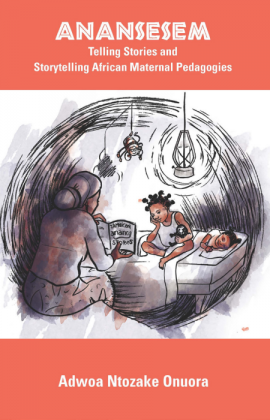
Price: $19.95
Page Count: 150
Publication Date: March 2015
ISBN: 978-1-927335-19-2
“Hallelujah! Finally! One of our “babies” has used the language and the euro-cen-tric dominated system of the academy to document, re-validate, and reassure African descendant parents in Canada, about the “rightness” of our parenting! Anans-esem reiterates what sister/sistah/granny/aunty/uncle/father/brother/ community Mothers of African-descendant children have been “doing”: it extrapolates the “knowing and doing” of our ancestors—free or oppressed, who used art forms as “cultural instruction” for thriving. Onuora is undoubtedly a product of “cultural genetics”: she knows, genetically and culturally! Everyone who believes in the equality of all peoples must read this. Anansesem is unequivocal about the essentiality of using cultural forms in the making of a person. She is right—our children’s “thrive barometer” is elevated by strategies that build “cultural, social and identity consciousness”: their “African Selfhood”; their “Being”. Peaceful Resistance! Survival! Possibility!”
—Joan Grant Cummings, parent, Black feminist activist, 2015
“Readers put your hands together for Adwoa Onuora’s book which shines the spotlight on those Knowledge Creators who are seldom in the light: Mothers, Afro-origin mothers; the Village it takes to raise a child; Storytellers and Artists. Adwoa’s book is Soul-affirming and Fun.”
—Rita Shelton Deverell, theatre artist, media producer, co-founder of Vision TV, and Adjunct Professor of Women’s Studies at Mount Saint Vincent University
Acknowledgments
Prologue 1
Note to Readers 13
Chapter 1: Pedagogies of the Spirit 17
Tell Me a Story 19
Webbed Toes and Fingers 24
Nine-Night 27
Chapter 2: It Takes a Village of Mammas 33
Anancy and Him Story 35
Sweet Shop 40
Washday 46
Chapter 3: Bright Eyes, Brown Skin, Nappy Hair: Epistemologies of Beauty 53
Nuttin Weh Too Black Nuh Good 55
The Erace(ing): Trapped in a Pigmentory Prison 61
Silky Straight 64
Chapter 4: The M(other) in the Mirror 67
(Im)Polite Violence 69
Bending Gender 77
Killing me Softly 81
Chapter 5: I Feel Therefore I Can … (be)long 87
Anancy and Common Sense 89
In My Mamma’s House 95
I’m a Black Girl 100
Epilogue: Narrative “Matters” 105
herstory is ourstory:
The Narrative of My Method 107
Glossary of Words 121
Adinkra Symbols: Their Meaning and Significance 122
Bibliography 124
Adwoa Ntozake Onuora received her Ph.D. at the University of Toronto in the Department of Sociology and Equity Studies in Education. A feminist mother, she lives in Toronto with her four year old daughter. Her work primarily focuses on using narrative representation and Afro-indigenous folk storytelling to explore the intersections and impact of gender, sexuality/sexual orientation, race, ethnicity, class and culture on African women’s lived experiences.


